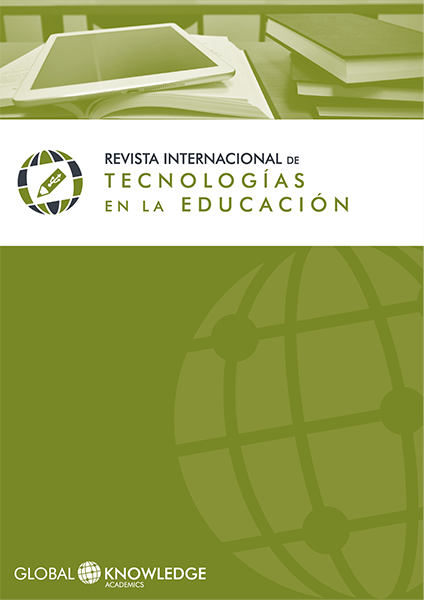Knowledge Management in the Cloud : User Interface Proposal for a Collaborative Knowledge Production System
DOI:
https://doi.org/10.37467/gka-revedutech.v6.2148Keywords:
Knowledge Management, Cloud Computing, Academic Research, Collaboration NetworksAbstract
Internet emerged as an opportunity to meet dissemination and scientific communication needs. The advent of Cloud Computing (CN) has made it possible to work within networks of academic collaboration in ubiquitous and inter active ways, contributing with continuous scientific research and development. Managing knowledge represents a need that must be addressed strategically. In this work, an interface for a Collaborative Knowledge Production System is proposed as part of a Knowledge Management integration strategy and as a primary design of a system with CN technologies in order to contribute to the identified knowledge frontier.Global Statistics ℹ️
|
745
Views
|
313
Downloads
|
|
1058
Total
|
|
References
Arboníes, A.L. (2006) Conocimiento para Innovar. Cómo evitar la miopía en la gestión de conocimiento. 2ª ed. Madrid: Díaz de Santos.
Argote, L., McEvily, B., & Reagans, R. (2003). Introduction to the special issue on managing knowledge in organizations: Creating, retaining, and transferring knowledge. Management Science, 49(4), 5–8. DOI: https://doi.org/10.1287/mnsc.49.4.0.14421
Avendaño, V. & Flores, M. (2016). Modelos teóricos de gestión del conocimiento: descriptores, conceptualizaciones y enfoques. Entreciencias: Diálogos en la Sociedad del Conocimiento, 4 (10), 201-227. Recuperado desde: http://www.redalyc.org/html/4576/457646537004/ DOI: https://doi.org/10.21933/J.EDSC.2016.10.181
Berners-Lee, T., Hall, W., Hendler, J. A., O’Hara, K., Shadbolt, N., & Weitzner, D. J. (2006). A Framework for Web Science. Foundations and Trends in Web Science, 1(1), 1–130. https://doi.org/10.1561/1800000001 DOI: https://doi.org/10.1561/1800000001
Bueno, E. (2000). Dirección del Conocimiento y Aprendizaje: Creación, distribución y mediación de Intangibles. Recuperado de http://www.sedic.es/bueno.pdf.
Cabero, J. (2004) La investigación en Tecnologías de la educación, Bordón: Revista de Pedagogía, 56(3-4), pp. 617-634. Disponible en: http://tecnologiaedu.us.es/nweb/htm/pdf/inv.pdf
Crespo, J. L. (2015). Herramientas para la producción y difusión del conocimiento a través de la Web 2.0. Anales de La Universidad de Cuenca, 71–76. Recuperado de http://dspace.ucuenca.edu.ec/handle/123456789/23352
Daft, R. (2010). Organization Theory and Design (10ª ed.). USA: South-Western, Cengage Learning
Geisler E. y Wickramasinghe, N. (2015). Principles of Knowledge Management Theory, Practice, and Cases. New York, USA: Routledge. DOI: https://doi.org/10.4324/9781315686448
Hessen, J. (2008). Teoría del Conocimiento. México: Editorial Época.
Hoffman D.L., Novak T.P., & Venkatesh, A. (2004). “Has the Internet become indispensable?,” Communications of the ACM, vol. 47, no. 7, pp. 37–42. DOI: https://doi.org/10.1145/1005817.1005818
Easterday, M., Lewis, D. y Gerber, E. (2014) Design-Based Research Process: Problems, Phases and Applications, en ICLS Proceedings Volume I, pp. 317-324.
Escudero-Nahón, A. & González, D. E. (2017). Propuesta para identificar la Investigación de Frontera en la Investigación Basada en Diseño sobre Nuevos Modelos Educativos. En L. T. Gómez Vera, L. Romero Guzmán, M. Mejía López, & R. Victoria Uribe (Eds.), Posibles Retos del Diseño ante grandes cambios (pp. 933–944). Universidad Autónoma del Estado de México.
Flores-Urbáez, M. & Peña-Cedillo, J. (2008). Gerencia del conocimiento y capacidades de innovación. Un estudio en laboratorios de investigación petrolera. Venezuela: Universidad del Zulia.
Highsmith, J. (2010). Agile Project Management. Boston:Pearson Education.
Kerschberg L. (2001). Knowledge Management in Heterogeneous DataWarehouse Environments. Recuperado de http://eceb.vse.gmu.edu/pubs/KerschbergDaWak2001.pdf DOI: https://doi.org/10.1007/3-540-44801-2_1
Martin, B., & Bruce, H. (2012). Universal Methods of Design: 100 Ways to Research Complex Problems, Develop Innovative Ideas, and Design Effective Solutions. Quayside Publishing Group.
Nieveen, N. y Plomp, T. (2013). Educational Design Research. p. 206. DOI: 10.1007/978-1-4614-3185-5_11 DOI: https://doi.org/10.1007/978-1-4614-3185-5_11
Nonaka, I., y Takeuchi, H. (1995). The knowledge creating company. Oxford University Press.
Plomp, T. y Nieveen, N. (eds.) (2007) An Introduction to Educational Design Research. Shanghai: SLO-Netherlands institute for curriculum development. Disponible en: http://downloads.slo.nl/Documenten/educatonal-design-research-part-a.pdf
Rodriguez, D. (2006). Modelos para la creación y gestión del conocimiento: una aproximación teórica. Recuperado de http://educar.uab.cat/article/view/187/168.
Salinas, J. (2014). La computación en la nube y sus posibilidades para la formación. En J. I. Aguaded Gómez & J. Cabero Almenara (Eds.), Tecnologías y medios para la educación en la e-sociedad. Madrid: Alianza Editorial.
Scarbrough, H. & Swan, J. (1996) Explaining the diffusion of knowledge management. British Journal of Management 12, 3-12 (2001). DOI: https://doi.org/10.1111/1467-8551.00182
Seaton, C. E., & Bresó, S. (2001). El desarrollo de un sistema de gestión del conocimiento para los institutos tecnológicos. Revista Espacios Vol. 22 (3). Recuperado desde https://www.revistaespacios.com/a01v22n03/01220321.html.
Sveiby, K. (1997). The New Organizational Wealth: Managing and Measuring Knowledge Assets. San Francisco: Barrett-Kohler Publishers.
Sveiby, K. (2000). Capital Intelectual, la nueva riqueza de las empresas, cómo medir y gestionar los activos intangibles para crear valor. Barcelona: Gestión 2000.
Valverde-Berrocoso, J. (2016). La investigación en Tecnología Educativa y las nuevas ecologías del aprendizaje: Design-Based Research (DBR) como enfoque metodológico. Revista Interuniversitaria de Investigación en Tecnología Educativa, 0 (junio), pp. 60-73. DOI: http://dx.doi.org/10.6018/riite/2016/257931. DOI: https://doi.org/10.6018/riite/2016/257931
Voas, J. & Zhang, J. (2009): Cloud Computing: New Wine or Just a New Bottle? IT Professional 11 (2), 15-17. https://doi.ieeecomputersociety.org/10.1109/MITP.2009.23 DOI: https://doi.org/10.1109/MITP.2009.23
Wiig, K. (2007). Enterprise Knowledge Management. Recuperado de http://www.krii.com/downloads/enterprise_km_2007.pdf
Wilson, T. D. (2002) The nonsense of Knowledge Management. Information Research, Vol. 8, No. 1.
Downloads
Published
How to Cite
Issue
Section
License
Those authors who publish in this journal accept the following terms:
- Authors will keep the moral right of the work and they will transfer the commercial rights.
- After 1 year from publication, the work shall thereafter be open access online on our website, but will retain copyright.
- In the event that the authors wish to assign an Creative Commons (CC) license, they may request it by writing to publishing@eagora.org







